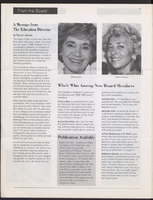Search the Special Collections and Archives Portal
Search Results

Sachiko Young oral history interview: transcript
Date
Archival Collection
Description
Oral history interview with Sachiko Young conducted by Mikaela Nettlow on December 5, 2021 for Reflections: The Las Vegas Asian American and Pacific Islander Oral History Project. Sachiko shares her upbringing in Fukoka, Japan and how she and her family moved frequently as a child. She talks about meeting her husband, an American military man, while visiting family in Tokyo. Sachiko discusses their marriage and birth of their child, their move to San Jose, California, and their travels back and forth from Japan before settling in Las Vegas, Nevada. She shares stories of visiting casinos with friends, working in hotel coffee shops, and what life was like for her and her family. Sachiko also talks of how she and her husband both faced racial prejudice from their families and the difficulties of learning English as a second language.
Text
Dorothy Eisenberg Papers
Identifier
Abstract
The Dorothy Eisenberg Papers (early 1900s-2009, bulk 1970-2000) are comprised of organizational records, photographs, newspaper clippings, and scrapbooks reflecting her activism and volunteer work related to education, the Bullfrog County Commission, Las Vegas Clark County consolidation, League of Women Voters (LWV), Las Vegas Jewish Federation, Equal Rights Amendment (ERA), and Silver State Political Action Committee.
Archival Collection
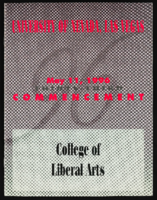
University of Nevada, Las Vegas (UNLV) College of Liberal Arts 33rd commencement program
Date
Archival Collection
Description
Commencement program from University of Nevada, Las Vegas Commencement Programs and Graduation Lists (UA-00115).
Text

Carole Fisher oral history interview: transcript
Date
Archival Collection
Description
Oral history interview with Carole Fisher conducted by Barbara Tabach on December 14, 2016 for the Southern Nevada Jewish Heritage Project. In this interview, Fisher discusses her family background and moving to Las Vegas, Nevada in 1979. Fisher talks about Nathan Adelson Hospice, programs that they provide for the Las Vegas senior community, and the increase of hospices in Las Vegas. She describes how Nathan Adelson Hospice is able to provide care for uninsured people, fundraising events they organize, and how their hospice differs from traditional hospital care. Lastly, Fisher discusses the significance of death in the Jewish religion.
Text
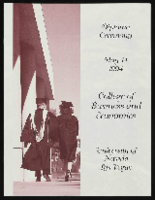
University of Nevada, Las Vegas (UNLV) College of Business and Economics Diploma Ceremony program
Date
Archival Collection
Description
Commencement program from University of Nevada, Las Vegas Commencement Programs and Graduation Lists (UA-00115).
Text

Mabel Hoggard School: ephemera
Date
Archival Collection
Description
Folder of materials from the Mabel Hoggard Papers (MS-00565) -- Educational work and legacy file. This folder contains the Mabel Hoggard 6th Grade Center 1984-1985 yearbook, correspondence to Mabel Hoggard, Mabel Hoggard School event programs, newspaper clippings, and other documents related to Mabel Hoggard School.
Mixed Content
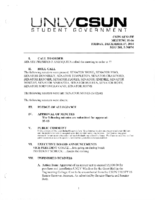
Meeting minutes for Consolidated Student Senate, University of Nevada, Las Vegas, December 17, 2004
Date
Archival Collection
Description
Text
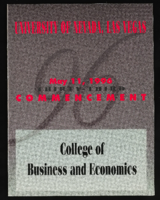
University of Nevada, Las Vegas (UNLV) College of Business and Economics 33rd commencement program
Date
Archival Collection
Description
Commencement program from University of Nevada, Las Vegas Commencement Programs and Graduation Lists (UA-00115).
Text

Transcript of interview with Horace Emery by Barry Sarles, March 2, 1980
Date
Description
On March 2, 1980, Barry Sarles interviewed river boatman and dam worker, Horace Emery (born 1911 in California) at his older brother’s farm in Nelson, Nevada. This interview covers the local area around Nelson and the early events that helped shape the area. Also present during the interview, Barry Sarles’s girlfriend, Diane Dobaj and Horace’s older brother, Merl Emery. Mr. Sarles also discusses his work as a river boatman on the Colorado River, working on the Hoover and Davis Dams, and employment as a factory worker in Clark County.
Text

